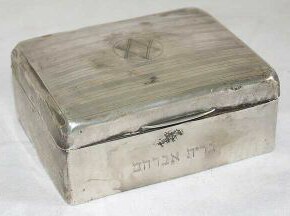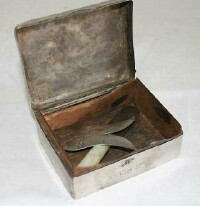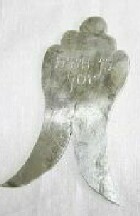
Circumcision sets
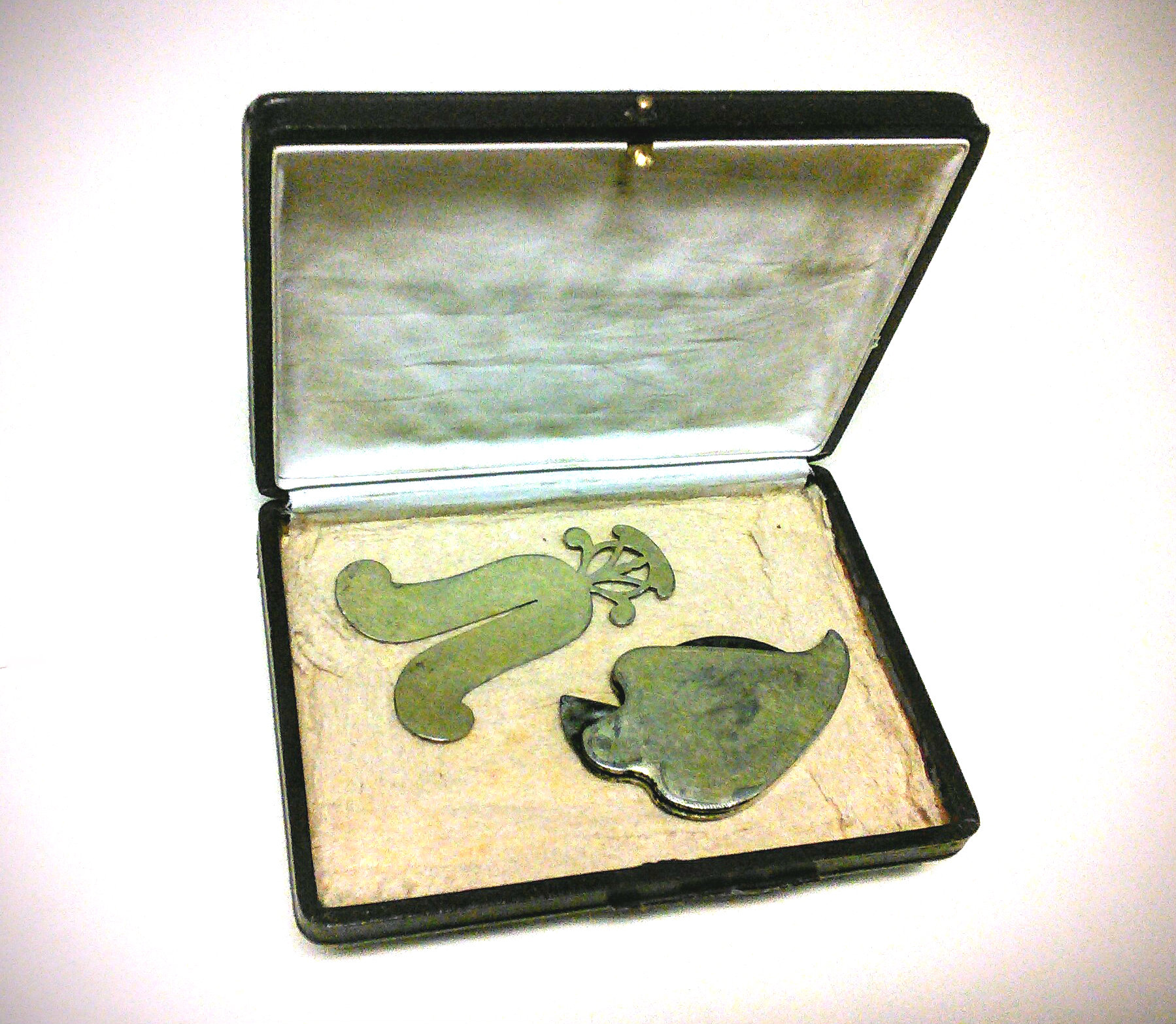
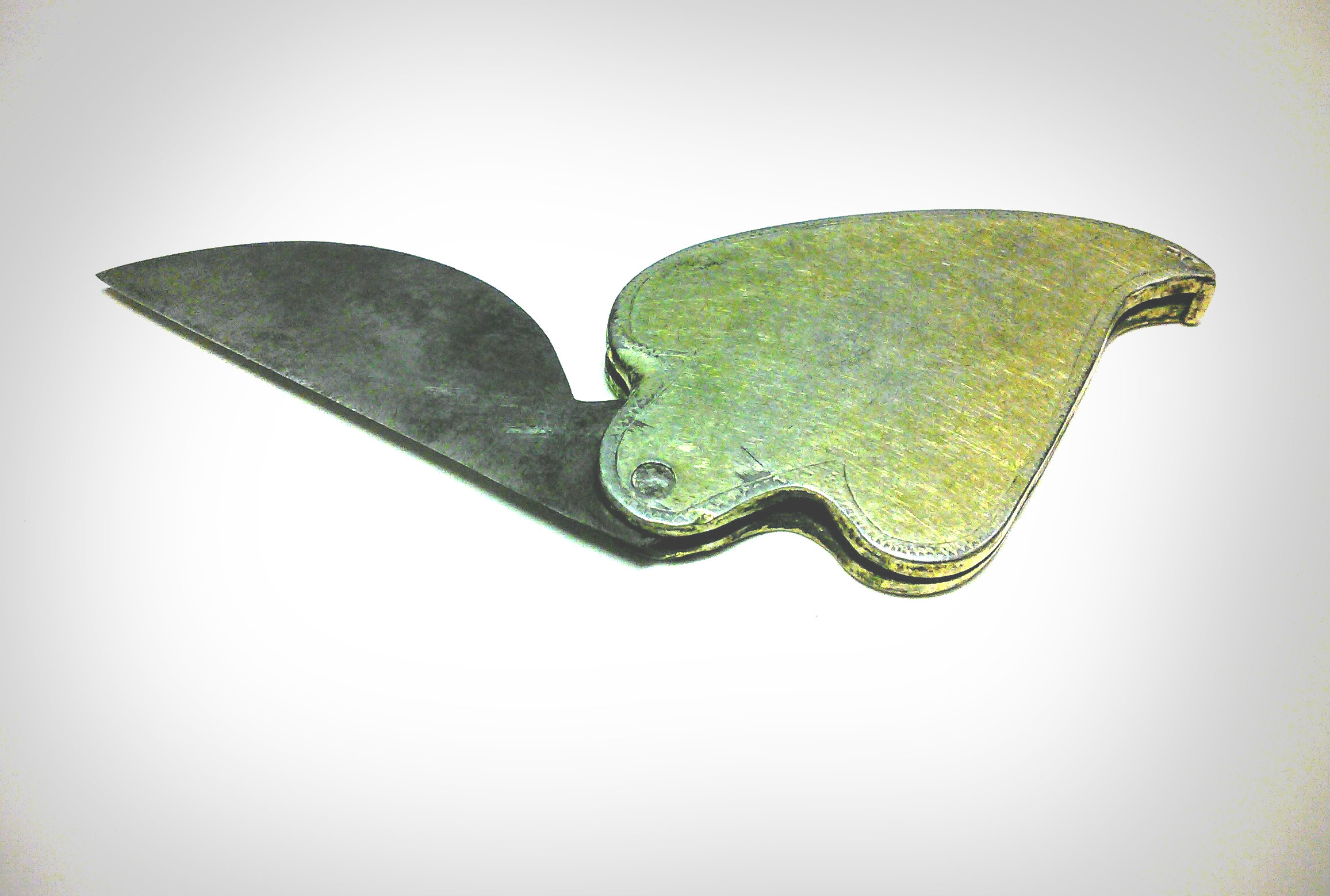
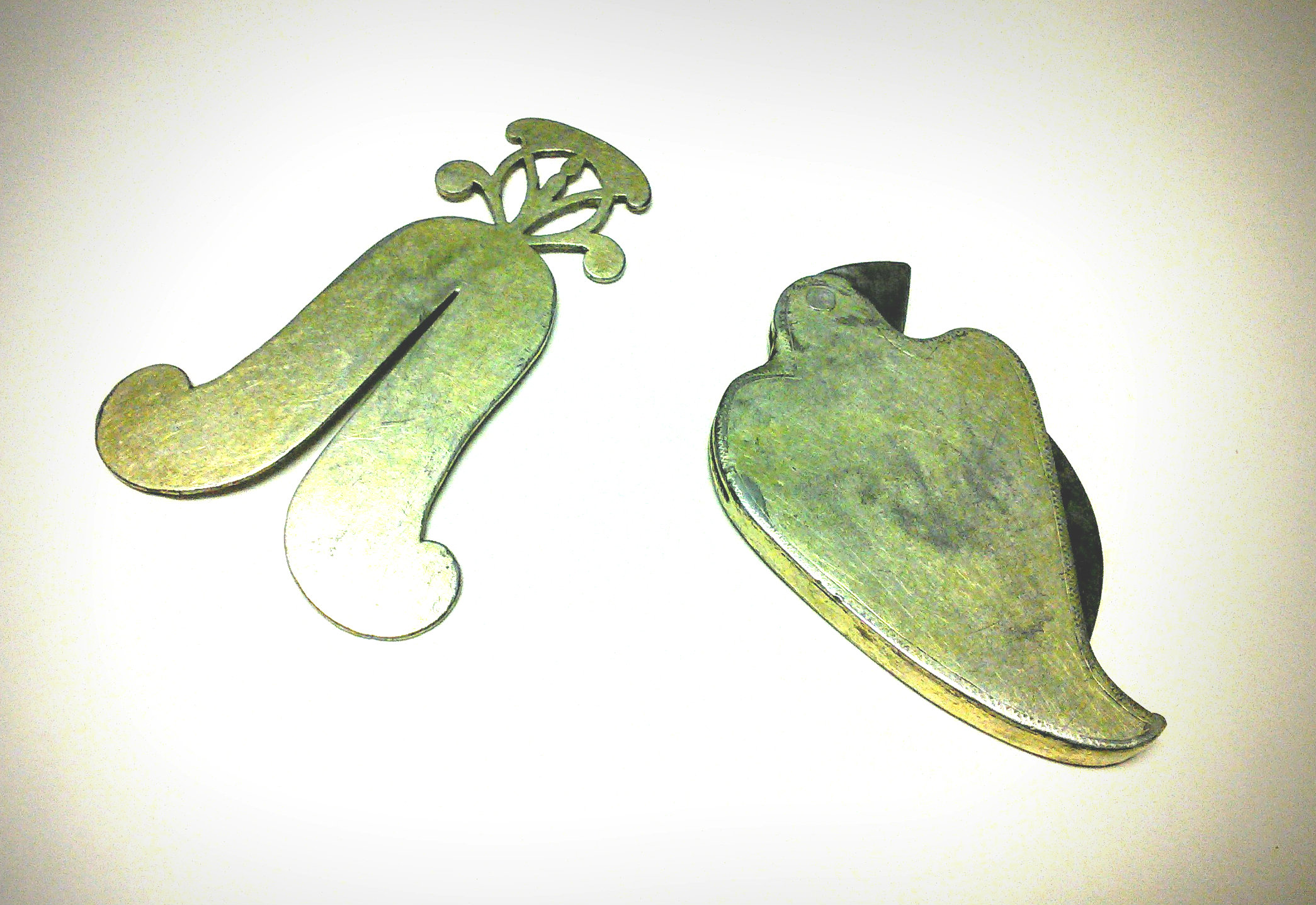
To the left and above are a rather rare folding circumcision knife
and a matching shield. The original gilding is still
present. The set is from Italy, 19th century.
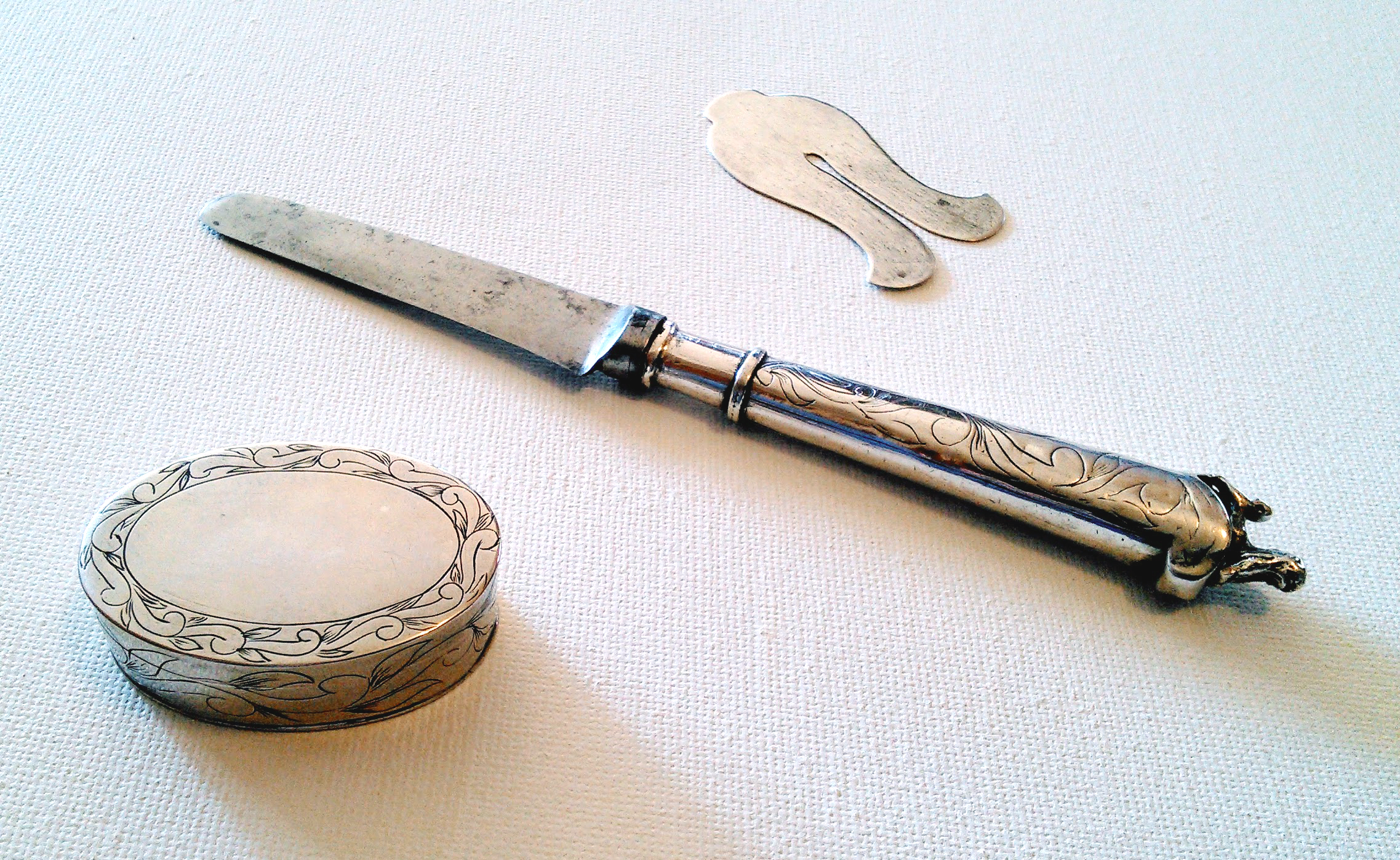
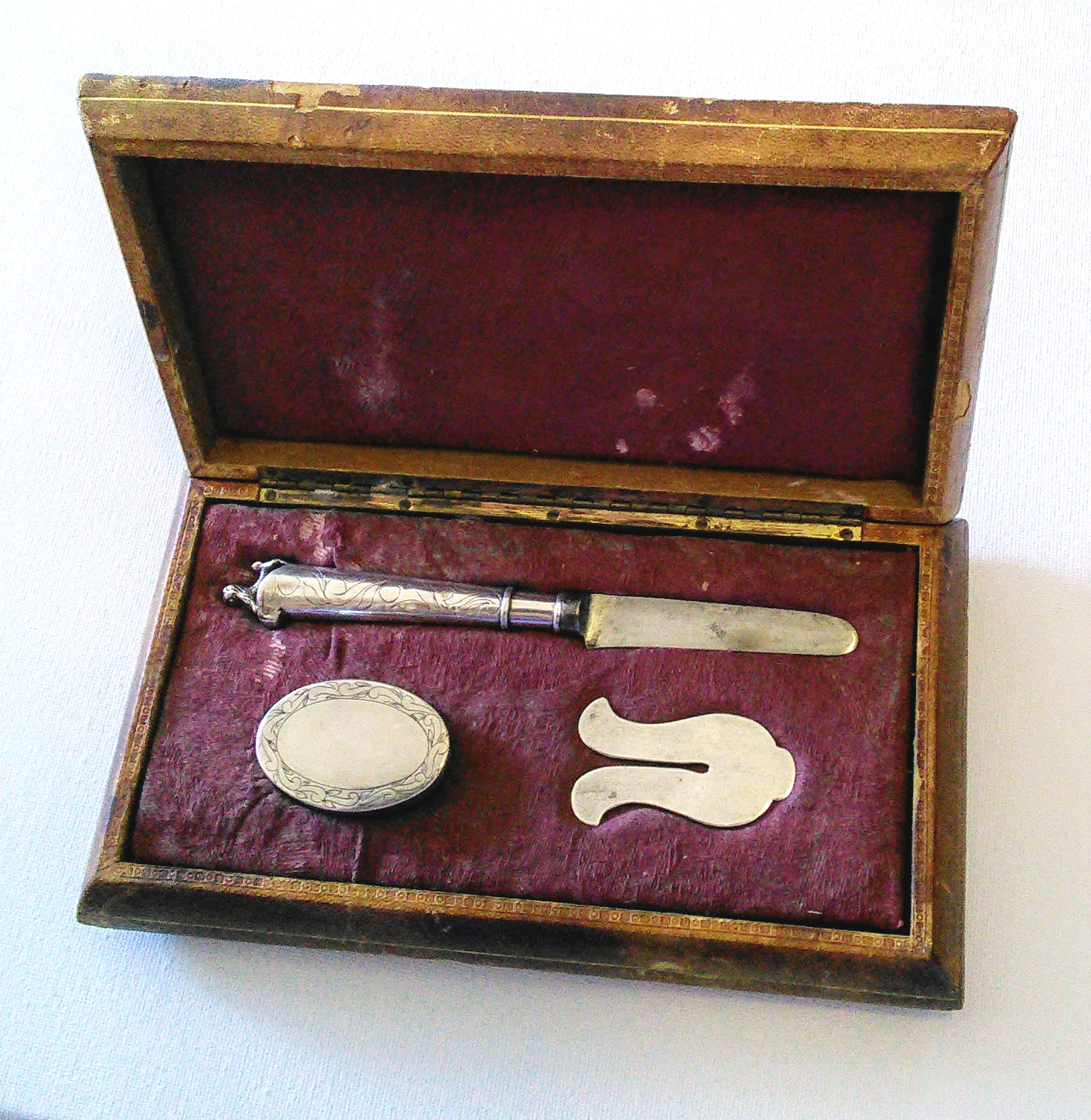 To
the right is an exquisite 18th century circumcision set from the
Netherlands. The case is leather-bound. The knife's blade is
one-sided. The powder box is hinged.
To
the right is an exquisite 18th century circumcision set from the
Netherlands. The case is leather-bound. The knife's blade is
one-sided. The powder box is hinged.
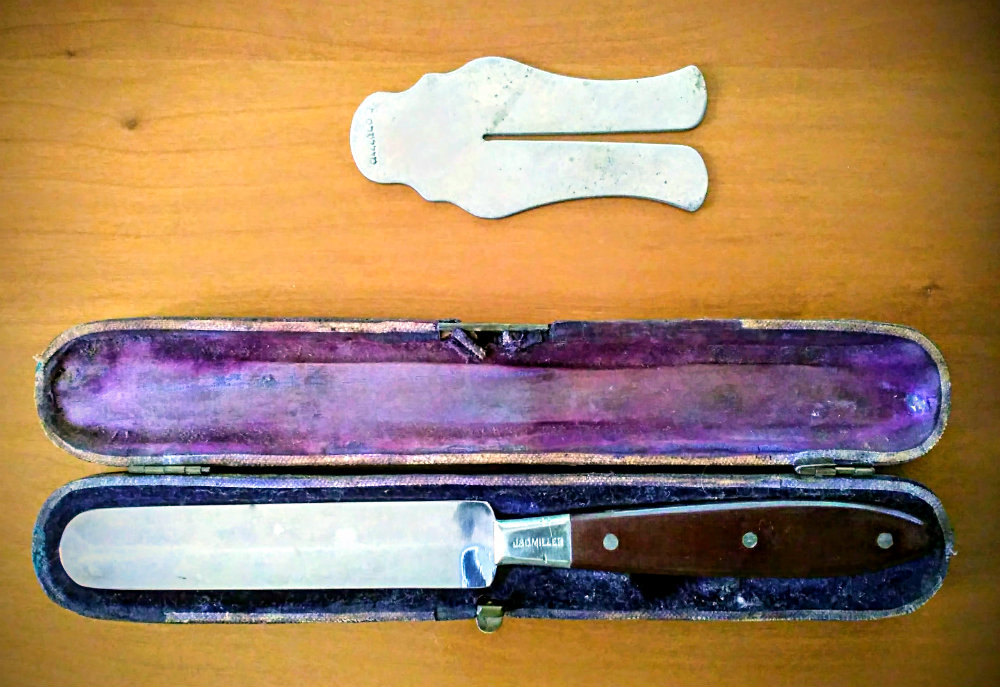 To the left is a knife, box and shield
from J. & D. Miller. During the early 20th century brothers
Joseph and David Miller ran a cutlery shop at 25 Canal Street, New
York City. They made the finest knives for Jewish ritual use--for
circumcision as well as for slaughtering poultry and cattle.
To the left is a knife, box and shield
from J. & D. Miller. During the early 20th century brothers
Joseph and David Miller ran a cutlery shop at 25 Canal Street, New
York City. They made the finest knives for Jewish ritual use--for
circumcision as well as for slaughtering poultry and cattle.
The above knife is unique because it appears to have a wooden
handle. It does not have the typical mother-of-pearl handle as
seen on the J. &. D. Miller knife below, which is from another
person's collection.

The 1920s sign below is at the
National Museum of American History (Smithsonian, Washington,
DC). Joseph and David Miller displayed the sign in their
knife shop. The circumcision knife and shield are at the top
left. The other knives are for poultry and cattle
slaughter. More information about the Millers can be found in this newsletter on
page 8.
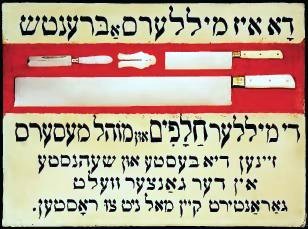
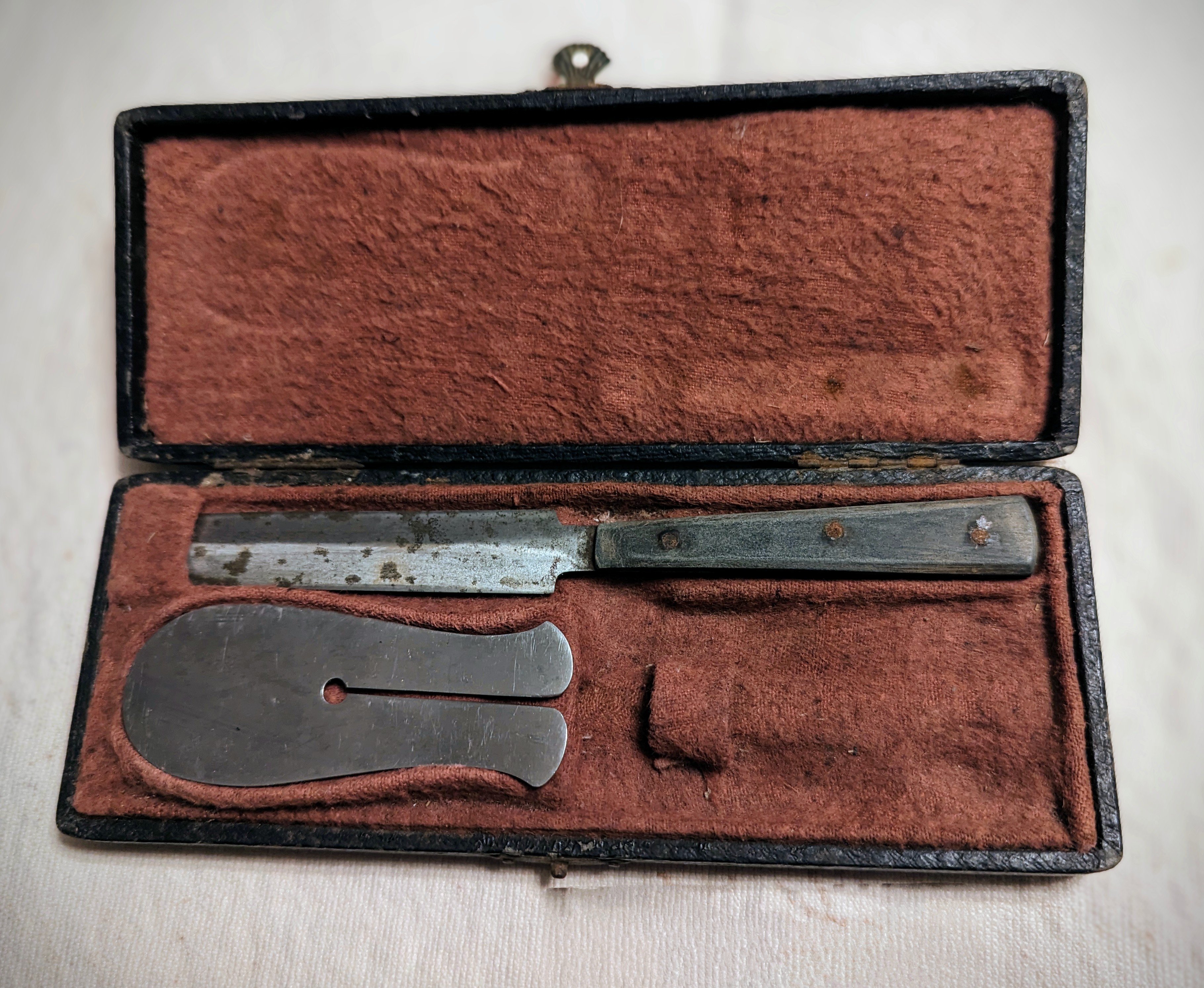 To the right is a circumcision
knife and shield set in a custom leather box, likely from
Eastern Europe, 1930s
To the right is a circumcision
knife and shield set in a custom leather box, likely from
Eastern Europe, 1930s
Below is a Polish knife and shield set, late 1800s. The
knife handle is made of ivory. The case is leather.
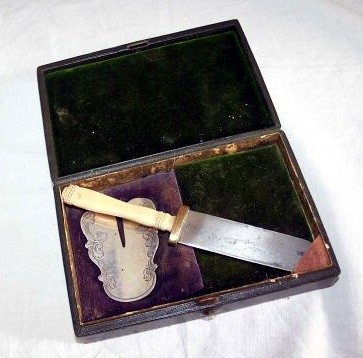
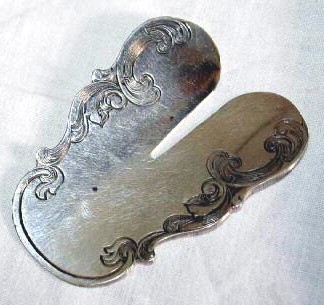

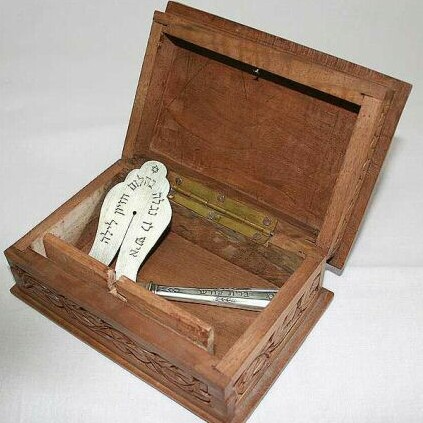 The seller attributed
the boxed set on the right to circa 1900, Poland. The box
is made of carved wood.
The seller attributed
the boxed set on the right to circa 1900, Poland. The box
is made of carved wood.
The set below features very exquisite work in mother of pearl.
There is a mid-19th century box with an intricate inlaid
floral design. The wonderful design is continued in the knife
handle, shield and accessories.
A set like this is truly unique. Experts were at odds
regarding its origin--is it a very rare example of Judaica
from India, or is it an example of mother of pearl work from
19th century Jerusalem?
Alas, a set like this is truly. . .fake. The
strongest clue is the shield. A mother of pearl shield would
never stand up to real use, and genuine Judaica was meant to
be used.
Many thanks to Kevin Tierney at Sotheby's New York for his
assistance.
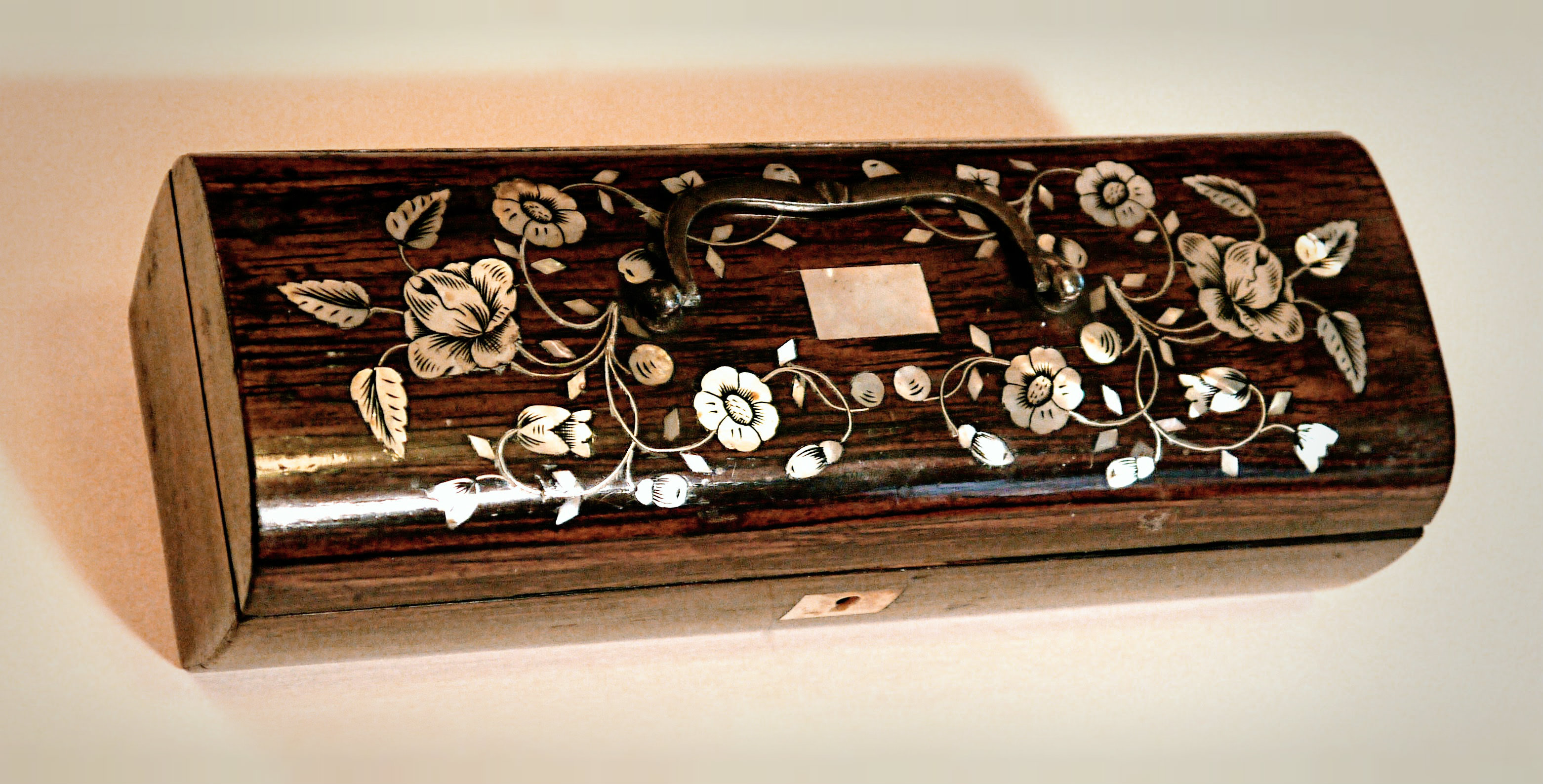
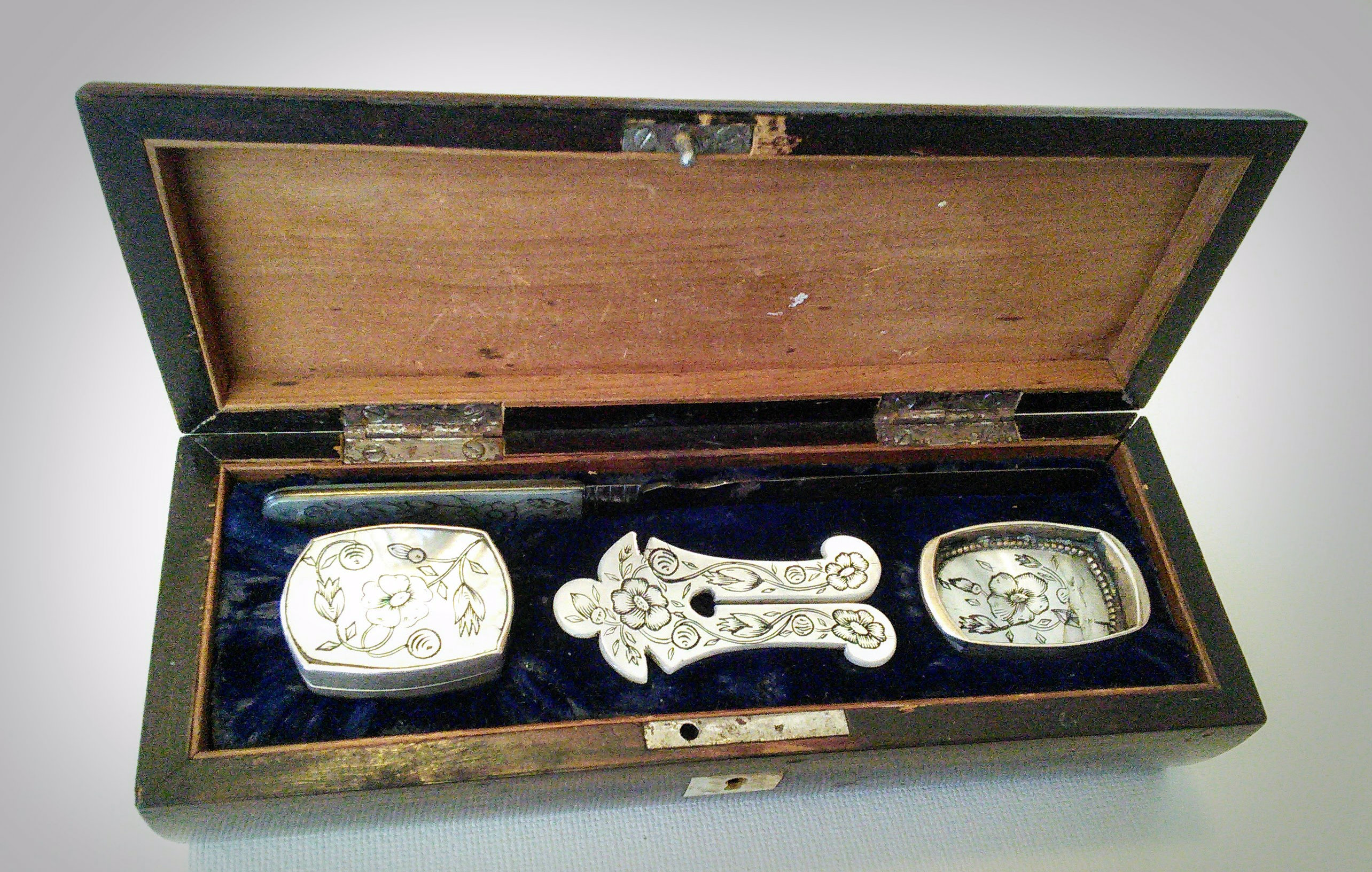
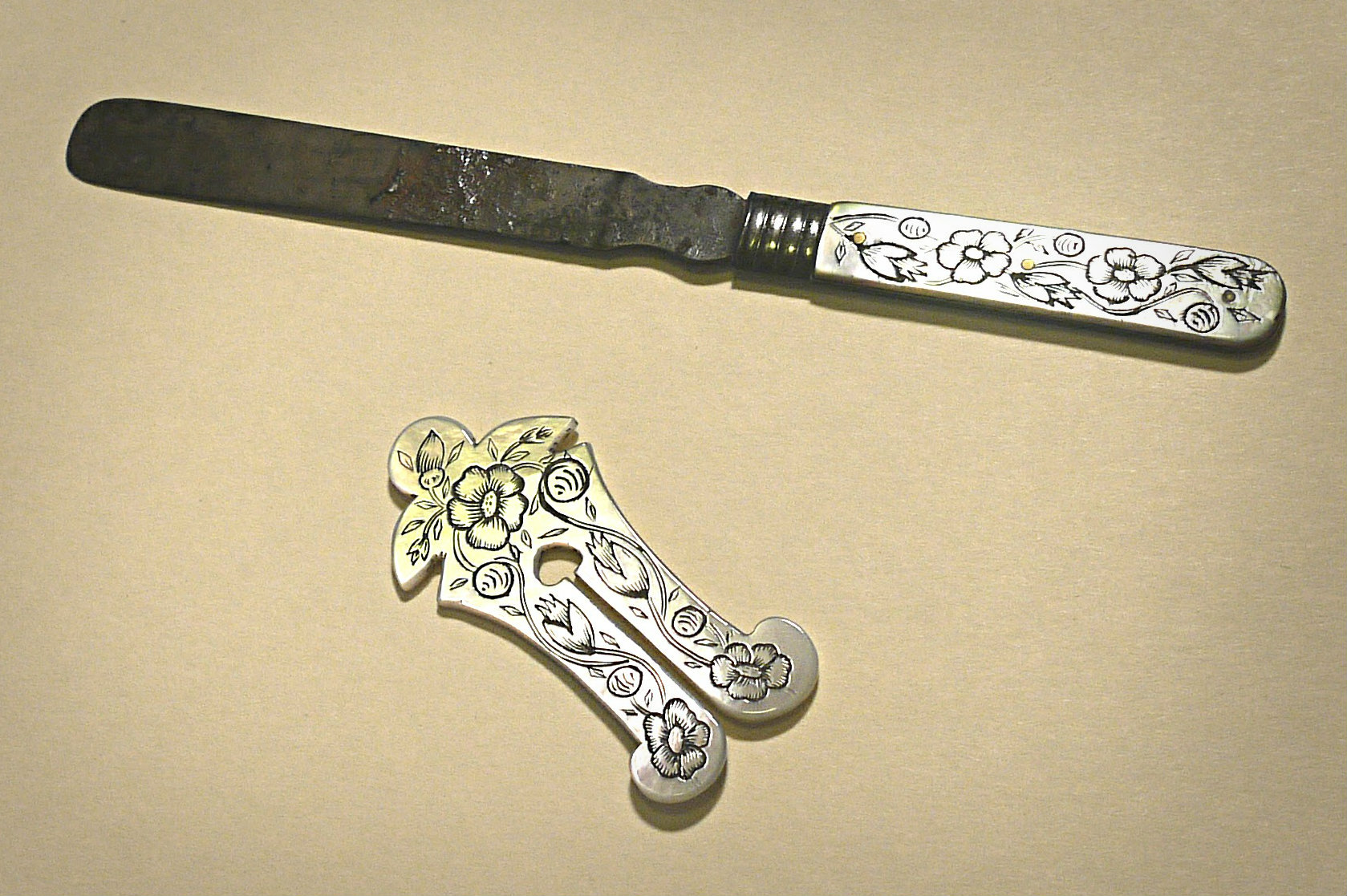
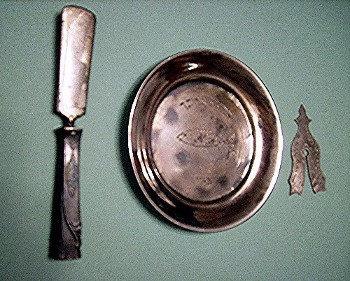 This is another circumcision set from Poland,
estimated to be from the late 1800s. The knife and plate
are engraved with a fish, a symbol of fertility.
This is another circumcision set from Poland,
estimated to be from the late 1800s. The knife and plate
are engraved with a fish, a symbol of fertility.
Below, an Israeli eBay auctioneer sold this silver knife and
shield set, circa 1920.
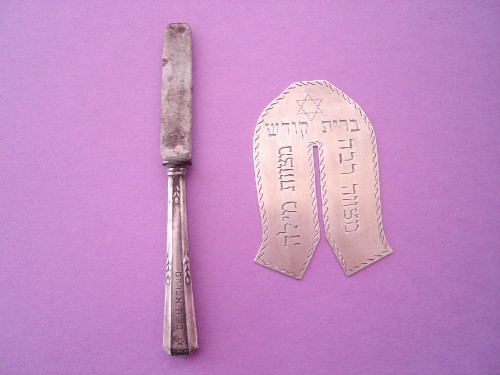
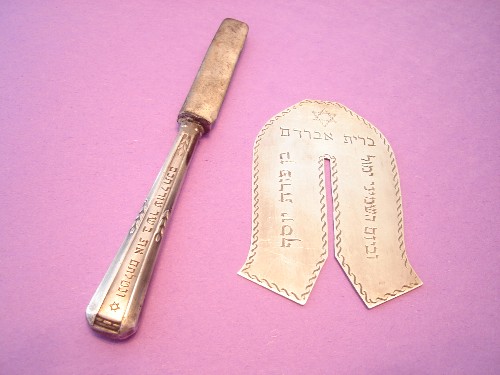 The same auctioneer sold a knife and shield set
in a wooden box, pictured below. He claimed that the set
was from Germany, 19th century.
The same auctioneer sold a knife and shield set
in a wooden box, pictured below. He claimed that the set
was from Germany, 19th century.
There are two problems with this set. First, the
knife, while beautiful with its mother-of-pearl handle, has a
faint stamp on the blade which reads "Hausmann, New
Orleans." The Hausmann family operated a jewelry store in New
Orleans from the late 1800s to the early 1900s.
Second, the shield pictured in the
auction was not the same shield that was sent to me.
Live and learn!
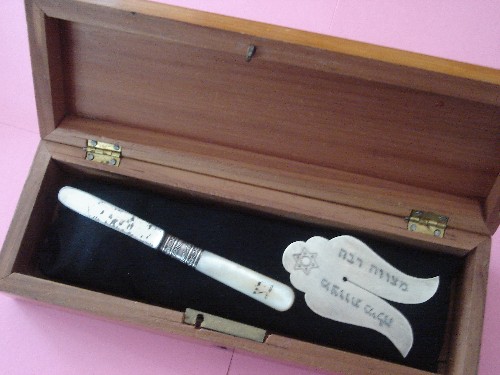
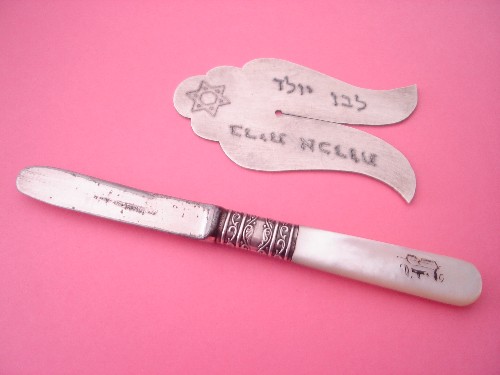

Below is a fine silver circumcision set from Birmingham,
England, 1923. The hallmarks identify the makers as
Cornelius Saunders and Francis Shepard. The knife has a
mother-of-pearl handle.
The next section features some thought-provoking
circumcision cups. This section also touches upon
the controversial metzitzah
b'peh. Please click the button
below.

Copyright 2006-2025,
Robert Lehrer, MD

 To
the right is an exquisite 18th century circumcision set from the
Netherlands. The case is leather-bound. The knife's blade is
one-sided. The powder box is hinged.
To
the right is an exquisite 18th century circumcision set from the
Netherlands. The case is leather-bound. The knife's blade is
one-sided. The powder box is hinged. 




 To
the right is an exquisite 18th century circumcision set from the
Netherlands. The case is leather-bound. The knife's blade is
one-sided. The powder box is hinged.
To
the right is an exquisite 18th century circumcision set from the
Netherlands. The case is leather-bound. The knife's blade is
one-sided. The powder box is hinged.  To the left is a knife, box and shield
from J. & D. Miller. During the early 20th century brothers
Joseph and David Miller ran a cutlery shop at 25 Canal Street, New
York City. They made the finest knives for Jewish ritual use--for
circumcision as well as for slaughtering poultry and cattle.
To the left is a knife, box and shield
from J. & D. Miller. During the early 20th century brothers
Joseph and David Miller ran a cutlery shop at 25 Canal Street, New
York City. They made the finest knives for Jewish ritual use--for
circumcision as well as for slaughtering poultry and cattle.

 To the right is a circumcision
knife and shield set in a custom leather box, likely from
Eastern Europe, 1930s
To the right is a circumcision
knife and shield set in a custom leather box, likely from
Eastern Europe, 1930s


 The seller attributed
the boxed set on the right to circa 1900, Poland. The box
is made of carved wood.
The seller attributed
the boxed set on the right to circa 1900, Poland. The box
is made of carved wood.


 This is another circumcision set from Poland,
estimated to be from the late 1800s. The knife and plate
are engraved with a fish, a symbol of fertility.
This is another circumcision set from Poland,
estimated to be from the late 1800s. The knife and plate
are engraved with a fish, a symbol of fertility.




